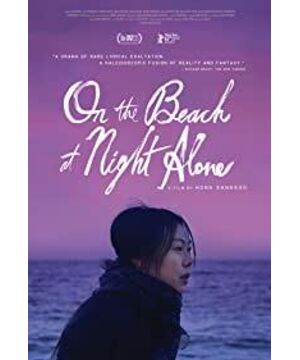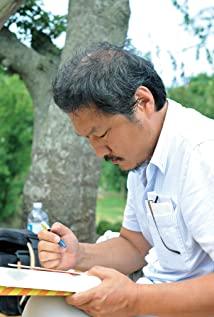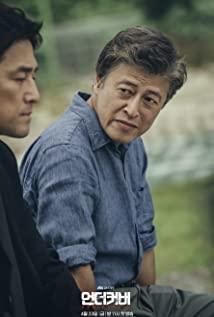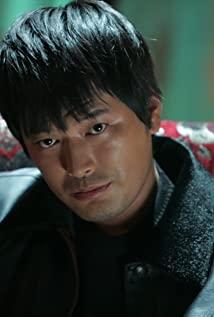The same woman (actress Young Hee) went to different beaches (Hamburg and Gangneung), met different people, and talked to them about similar topics (cold, hungry, old, tired, lonely, lust, straightforward, etc.) . Among different people, there are various similar roles (all have a close sister who is waiting for the director at the beach) or the same identity (both have mysterious strangers wearing hats). In this way, the various elements contained in this two-stage style are indeed Hong Changxiu's usual tricks: when Young-hee is sitting alone in the movie theater, the similar red seat background is like a scene from "The Right Now". "Wrong Then" came through; and "Quan Haixiao" appeared on the stage and asked Yingxi "why did he pretend not to know me", just like he was still carrying the complaints and grievances accumulated in "You and You"; "Zheng Zaiyong" The hug of her head seems to echo the headache of "Li Yuying" at the end of "Yourself and All You"; as far as the state of Yingxi in the film is concerned, she is of course both "In a Foreign Land" and "Woman by the Sea".
An important feature of Hong's structure is the presentation of various details that can be compared, the so-called finding differences in repetition, and then discovering and reconstructing those inexplicable but often new tastes. Looking at the 1st and 2nd paragraphs of this film, although the correspondence between the duration and content is not exactly the same, the focus is obviously the aftertaste between the change and the constant. It can be seen both as the actress's two life experiences in a foreign country and after returning to China, as well as the uneven blending and complementation of reality and dream, especially in the second segment of Gangneung, where Young-hee is called by the seaside She woke up twice. If the second wake-up is regarded as a real situation, then from the first time she was woken up to the reality, that is, Young-hee was woken up by the crew and met the director. , it is obviously just a dream. But in fact, we can take a longer view. If we treat the two seasides as the same place (or the same virtual finger), then the whole second paragraph is in Gangneung, then it may also be her seaside in Hamburg A dream, so the long experience before being woken up for the second time is equivalent to a dream within a dream. As the projection and repair of reality, the dream state is nothing but a hopeless waiting, and the similar interplay between reality and reality can also remind people of "Hae Won Who Is Not Anyone's Daughter".
Aside from the film itself, a topic that has been hotly discussed is the intertextuality between film and life, just like Woody Allen copied his real-life marital crisis with Mia Farrow in "The Good and the Good". In general movies, the story of Young Hee and the male director engaging in extramarital affairs is hard not to make people think of it. Although Hong Changxiu stated that this is not an autobiographical film, the interesting thing about reality and fiction is that Gao Ming’s fiction is always predictable. And forward-looking, it shines into reality and guides reality at the same time. For example, the male director in the film repeatedly praised Young-hee as a very good actor, and Jin Min-hee was indeed awarded the Berlin Actress for this role. Her confession at the awards ceremony ("All thanks go to Director Hong Changxiu, I respect You, I love you") and the line that Yingxi specifically said to the director in the film ("You love me so much, of course I want to thank you"). Young-hee's straightforward and innocent character continues to form a sympathetic relationship.
Based on this, we can also talk about Hong Changxiu's fine-tuning of creation. In addition to the eloquent classical soundtrack, it also shows a relative increase in close-up shots. At the end, Young-hee had a conversation with the director, and the shot was even close to the faces of the two of them. Moving back and forth between people, such frequent and urgent subjective interventions are also rare in his previous works. In addition, some of Jin Minxi's lines and slogans have a particularly strong meaning. The reason is probably related to the director's involuntary tenderness at this stage. As one of the parties, Hong Changxiu did not choose to cut in from the perspective of a straight man this time, but approached the mood of women with a sufficiently patient and solemn attitude. However, he is only as considerate and tolerant as possible to the heroine. It may be precisely because of this love and pity that the female characters in his works are more mysterious and fickle (such as Haewon and Shanxi), so far they have finally seen a rare temperament. It also became more flesh and blood.
Finally, I have to specifically talk about the "not good-looking" of the film. In an interview at this year's Berlin Film Festival, Director Hong made some remarks on "counter-story", which means that he has always been ashamed to express his views with the help of characters, because no matter how loud a view is, it cannot become the truth for everyone, so he has always been He has no intention of reasoning and moral criticism, but since 2015's "Wrong Now, Right Then", he has begun to express some views that represent his personal views. But at the same time, he also talked about his resistance to clichés. The accustomed narrative does give people a sense of pleasure, but he prefers to avoid that feeling. "It used to be difficult, but it's okay now."
Personally, I think this will probably be a turn of his future works. That is, while expressing something, in order to avoid the generation of pleasure (from routine to meaning), he will mix in some "anti-opinion" remarks, sometimes to balance and sometimes to break the balance, so let's emphasize deconstruction, The contrast traces are naturally more blurred, and the meaning expression is therefore more ambiguous. In short, the story will become weaker and weaker. This feeling is still indescribable, but if combined properly, it may be a brand new emotional creation.
View more about On the Beach at Night Alone reviews











